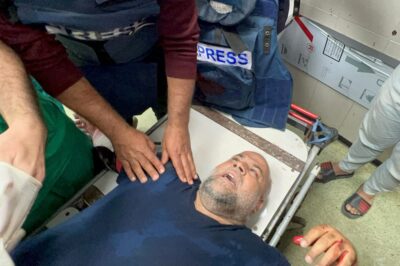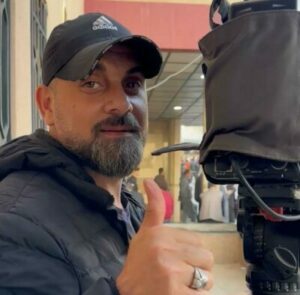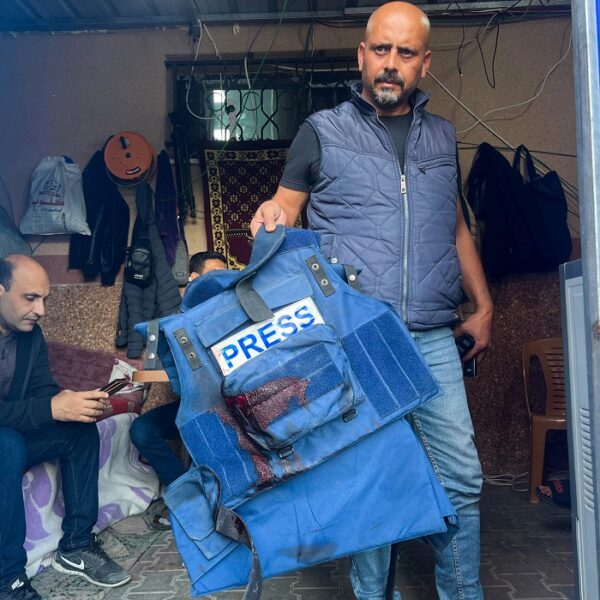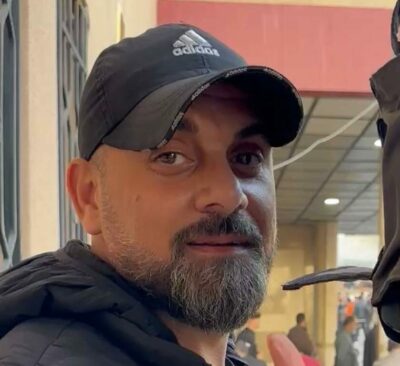Updated on December 15, 2023 at 11:51 pm
The Al-Jazeera cameraman, Samer Abu Daqqa, 45, died on Friday evening, after an Israeli drone strike targeted the Khan Younis Secondary School for Girls (Farhanah) in the souther Gaza Strip.
Abu Daqqa and journalist, Wael Al-Dahdouh, Al-Jazeera correspondent and the director of its office in Gaza were both injured by the drone strike on Friday afternoon.
Ambulance crews were unable to reach the injured Abu Daqqa due to continuous Israeli shelling in the area, causing him to bleed for more than five hours.
According to the Palestinian Journalists Syndicate, with the death of Abu Daqqa, 75 journalists have been killed by the Israeli occupation since October 7.
First published on December 15, 2023 at 8:52 pm
Two Palestinian journalists were injured, on Friday, after an Israeli drone strike on a school in Khan Younis in the southern Gaza Strip, which had been bombed at dawn, killing five and injuring dozens.
On Friday afternoon an Israeli drone fired a missile at the the Khan Younis Secondary School for Girls (Farhana), which is housing many displaced Palestinians in the southern Gaza Strip.
Israeli forces bombed the Farhana school at dawn Friday, killing five Palestinians and wounding dozens of others.

Al-Jazeera correspondent and director of its Gaza office, journalist Wael Al-Dahdouh and Al-Jazeera cameraman, Samer Abu Daqqa were at the scene covering the bombing when an Israeli missile struck, injuring them and many Palestinian civilians.
Al-Dahdouh sustained a shrapnel wound from the missile in his arm and was transported to Nasser Medical Hospital in Khan Younis where his injuries were described as mild to moderate.
The condition of Abu Daqqa is not known at this time as ambulances have been unable to reach the scene due to heavy Israeli shelling in the area, Al-Jazeera reported.
It added that ambulance crews needed “approval” from Israeli forces to reach Abu Daqqa, who is critically injured and has been left bleeding since the attack.

Media sources said that the wounded journalists were wearing helmets and protective armor clearly indicating that they were journalists, adding that 80 journalists have been killed covering the aggression against the Gaza Strip which began on October 7.
In a report released December 14, the Office of the United Nations High Commissioner for Human Rights said that “Gaza has seemingly become the deadliest place for journalists – and their families – in the world.”
The report quoted the International Federation of Journalists, saying that “73% of the total number of journalists and media workers killed globally so far in 2023 have been in Gaza.”
The head of the Middle East desk at Reporters Without Borders (RSF), Jonathan Dagher, told Al-Jazeera that today’s attack “is an unacceptable attack against brave journalists who are covering the conflict in Khan Younis”.
Dagher added that “This is, of course, in the wider context of Israeli attacks against journalists,” and stated that the rights group would carry out an investigation into whether or not the journalists were targeted.
He added “We remind very strongly that targeting journalists … covering a war is a war crime.”
It is important to mention that on October 25, Al-Dahdouh’s wife, 15-year-old son, 7-year-old daughter, and 18-month-old grandson were all killed by an Israeli airstrike in the Nusseirat refugee camp in central Gaza.
The family had left their home in Tel el-Hawa in Gaza City in northern Gaza, due to the intensity of the Israeli bombing in the north, and sought refuge with family members in the Nusseirat camp.
Israeli forces bombed the home that he and his family had hoped would be safer than their home in the northern Gaza Strip.


